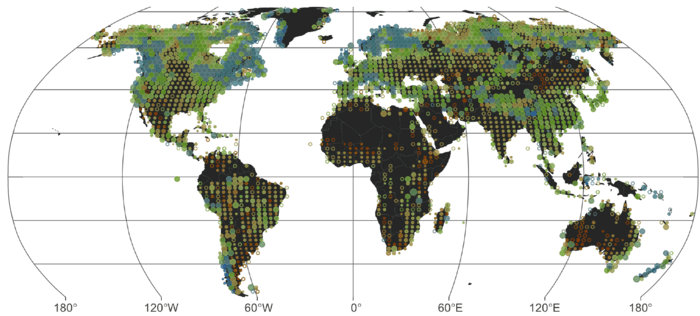Climate change is impacting the Earth so acutely that it’s rapidly changing the color of the planet. In a new study, scientists have shown how warming global temperatures are turning the world’s blue lakes to a murky green-brown color.
The color of a lake is influenced by a bunch of factors, most notably levels of algae and sediment. The latest research also shows how air temperature, precipitation, lake depth, and elevation also help to determine a lake’s hue.
Blue lakes account for less than a third of the world’s lakes and green-brown make up the remaining two-thirds. Bluer lakes tend to be deeper and are found in cooler, high-latitude regions with high precipitation and winter ice cover, while green-brown lakes are found in drier regions, continental interiors, and along coastlines.
Swamped by climate change, it looks like these rare blue lakes are becoming even more uncommon. Scientists at the University of North Carolina at Chapel Hill looked at over 5 million Landsat-8 satellite images detailing 85,360 lakes and reservoirs from around the world from 2013 to 2020, keeping a close eye on their color changes. You can see the findings of their work in this interactive map.

The new study presents the most extensive map of lake color, revealing that most of the world’s lakes are already green-brown rather than blue. Image credit: AGU/Geophysical Research Letters
The researchers found that blue lakes are on the decline. They believe the reason for this is rising temperatures associated with climate change that are causing algae to thrive in lakes. Although microscopic, the build-up of the algae can profoundly change the change of a lake en-mass.
“Warmer water, which produces more algal blooms, will tend to shift lakes towards green colors,” Catherine O’Reilly, an aquatic ecologist at Illinois State University and author of the new study, explained in a statement.
“Nobody wants to go swim in a green lake,” said O’Reilly, “so aesthetically, some of the lakes that we might have always thought of as a refuge or spiritual places, those places might be disappearing as the color changes.”
However, aesthetic changes are just the beginning of the trouble. The shift in color is also an indication of how these ecosystems are drastically changing, which will affect the wildlife and humans that rely on them.
“If you’re using lakes for fisheries or sustenance or water drinking water, changes in water quality that are likely happening when lakes become greener are probably going to mean it’s going to be more expensive to treat that water,” explained O’Reilly.
“There might be periods where the water isn’t usable, and fish species might no longer be present, so we’re not going to get the same ecosystem services essentially from those lakes when they shift from being blue to being green.”
The new study was published in the journal Geophysical Research Letters.
Source Link: The Climate Crisis Is Literally Changing The Color Of Our Planet